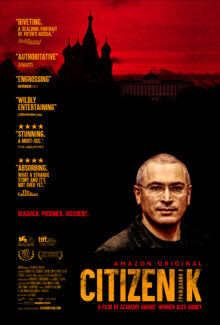Citizen K (Alex Gibney, 2019): UK, USA
Reviewed by Saman David Mansourian. Viewed at the AFI Fest 2019.
 This is one of those documentaries you occasionally come across on Netflix, or nowadays, Amazon, which feels like time well invested. While watching, you think to yourself, “Oh, that is an interesting fact”, “Ah, I did not know that”. Combined with Alex Gibney’s – the Academy Award winning documentary filmmaker – genius storytelling, it is a comfortably digestible experience.
This is one of those documentaries you occasionally come across on Netflix, or nowadays, Amazon, which feels like time well invested. While watching, you think to yourself, “Oh, that is an interesting fact”, “Ah, I did not know that”. Combined with Alex Gibney’s – the Academy Award winning documentary filmmaker – genius storytelling, it is a comfortably digestible experience.
Citizen K tells the story of the rise of Russia’s oligarchs with focus on Michail Khodorkovsky – a highly intelligent entrepreneur who manages to build his capitalist industries from poverty amidst the fall of the communist Soviet Union. Although I walked away viewing Khodorkovsky as a redeemed hero, his history is far from an innocent one. Because the Soviet rulebook was so vague back in the days, there were plenty of leeway for Khodorkovsky to play the game of capitalism heavily in his favor. The amount of money he was able to generate through his banking and oil businesses allowed him and the other oligarchs great influence over the government. Khodorkovsky was a key player in keeping Yeltsin elected in the 90s. Through shady and well strategized deals, he and the other oligarchs were compensated with buying government industries out after they went bankrupt with heavy discounts, and made the Russian government dependent on the oligarchs. Simultaneously, the film depicts the rise of Vladimir Putin, Russias current president – an intelligent former KGB officer with great interpersonal skills, creating the perception of friendship with people in power by appearing agreeable whilst secretly pursuing his own plots and plans contradicting many of his allegiances. The story builds the two separate timelines of Khodorkovsky and Putin up as they inevitably clash with common interests in mind. Putin’s ego cannot handle any threat to his ruling, and after some head-to-head arguing with Khodorkovsky, he begins taking him down by dismantling his team, his company, and eventually putting Khodorkovsky in jail where he was able to do deep work on himself, cultivate compassion and empathy, and toning down the relentless and ruthless personality he previously possessed. Although these traits are deeply engrained within him, they are now complementary to his elevated character where he attempts to do genuine good. It is his response to adversity, in spite of Putin’s corrupt actions that would scare the majority of people, which is particularly inspiring. Khodorkovsky is a man of integrity.
One of my main concerns watching or listening to something informative is whether the information provided is unbiased and factual. It is a particularly important concern with documentaries since it’s such an intimate and isolated experience. The viewer is personally interacting with the frames and audio provided, taking ideas in, refreshing their understanding of certain topics – in this case – countries and politicians, whilst affected by music and sounds which enhances our emotional responses. After I finished the film, I felt like I knew Russia better. I do know Russia a little bit better now, but not in the general context I want to believe. This is the flaws of my own biases and perception-creation, and I am probably not alone. Think about it like this – how many times a month do you commit 2 hours of your life to learn about something specific such as the Oligarchs and Russia? Every single fact provided to you on the side, you take note and add it to your information bank. Assuming you are as knowledgable as me on Russia (very little), the addition of information to your already limited hard-drive makes you believe that you know so much more now – that your perception of Russia is now more accurate. The filmmaker could have portrayed many things incorrectly, and I still would have deemed it accurate. It is a revelation I consistently make when walking away from something informative – we are so extremely susceptible to propaganda.
My view of Russia drastically changed after watching this. This is not a critique towards the filmmaker, but rather a note on my lack of knowledge on Russia. My point is that we should be careful with our conclusions that we are tempted to make after following a story with a specific emphasis. Although Gibney is obviously a proven man, on a serious scene such as the AFI who, we need to be vigilant on the factuality of the information that we consume. Gibney’s film tell us about the Russian government, the rise of Putin, and the current state of Russia’s disguised oppression, it is not the whole story of Russia. The general tone depicted may very well be accurate, but there is more nuance to be derived which cannot be illustrated in merely 2 hours, and I think it is important to keep that in mind.
All this goes without saying that Alex Gibney is a fantastic storyteller and director. I am very happy that I invested my time in watching his fantastic piece of work. I gave him a 5 in the ballot vote. I am looking forward to exploring more of his work.
About this entry
You’re currently reading “Citizen K (Alex Gibney, 2019): UK, USA,” an entry on Student Film Reviews
- Published:
- 11.16.19 / 9pm
- Category:
- AFI Filmfest 2019, Documentary
3 Comments
Jump to comment form | comments rss [?]